We respect your right to privacy. You can choose not to allow some types of cookies. Your cookie preferences will apply across our website.
Unlock the potential of Automotive Artificial Intelligence with our personalized AI/ML solutions designed specifically for the automotive industry. Train your tech product to provide precise responses to user queries, enabling customers to make informed decisions regarding vehicle purchases, repairs, and maintenance.
Revolutionize customer interactions with AI automotive solutions, boosting satisfaction and establishing a reputation for exceptional service.
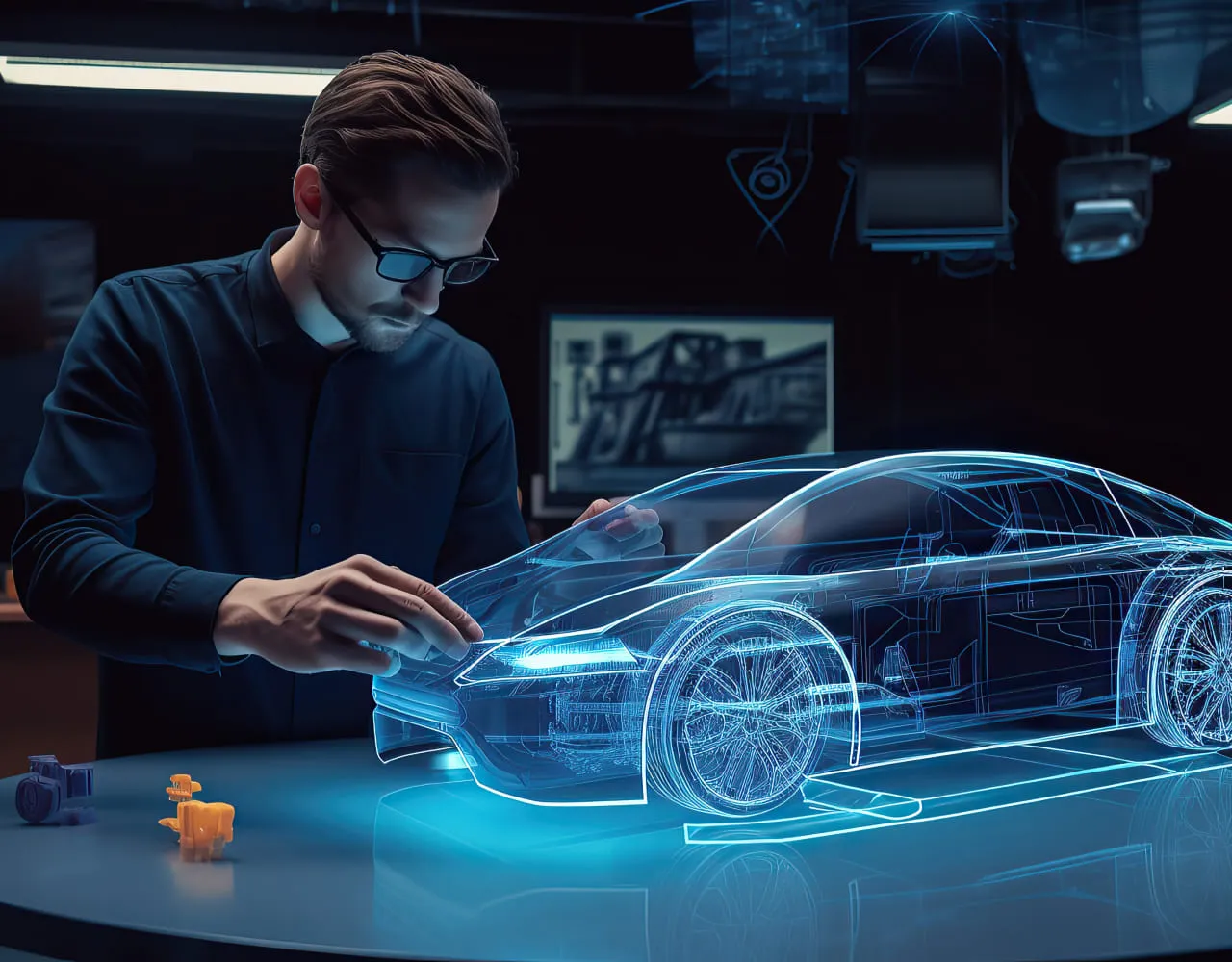
Use AI to analyze customer data, gaining valuable insights into buying patterns and preferences for targeted marketing and product development strategies.
Optimize automotive supply chains for enhanced logistics efficiency, inventory management, and demand forecasting for streamlined production processes with Ai.
Implement AI in advanced driver-assistance systems (ADAS) for enhanced safety features such as lane detection, collision avoidance, pedestrian detection, and adaptive cruise control.
Implement voice recognition technology for hands-free control of in-car systems, enhancing driver convenience and overall safety.
Use AI in research and development for innovative automotive design, materials selection, and engineering solutions, pushing the boundaries of creativity and efficiency.
Develop AI-powered in-vehicle experiences, offering personalized features like adaptive climate control, entertainment systems, and driver-assist features tailored to individual preferences.
Offer tailored AI/ML solution development to address specific challenges or innovations in the automotive sector, providing bespoke solutions for unique requirements.
Unlock Innovation, Efficiency, and Growth.

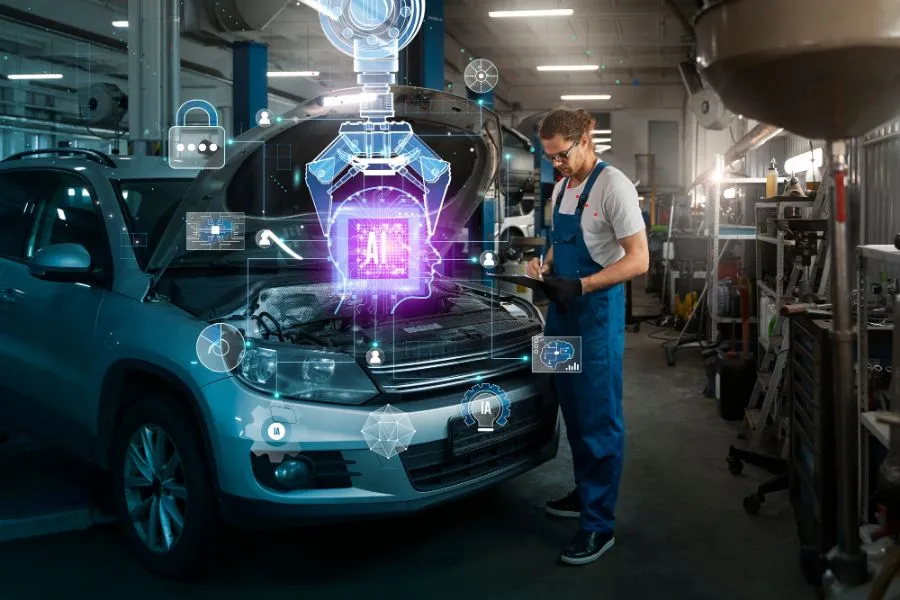
Understanding the role of AI and ML in the automotive industry is crucial as technology continues to advance. The global Automotive AI Market size is predicted to reach USD 25.78 billion by 2030, with a CAGR of 29.2% from 2024 to 2030. This user-friendly guide aims to simplify the basics of Artificial Intelligence (AI) and Machine Learning (ML) in the context of cars.
Automotive Artificial Intelligence Defined
Let’s delve into what we mean by Automotive Artificial Intelligence. Instead of a complex term, consider it the engine driving new and smart AI automotive solutions in the automotive world.
The infusion of Automotive Artificial Intelligence (AI) and Machine Learning (ML) into the automotive industry yields a host of benefits, shaping a future where vehicles are not just modes of transportation but intelligent companions on the road.
As we witness the integration of AI/ML in automotive, the impact is not just on the vehicles themselves but on the entire driving experience. From safer roads to personalized journeys, the benefits of AI in the automotive industry extend beyond technology – they pave the way for a smarter, more efficient, and sustainable future on the road.
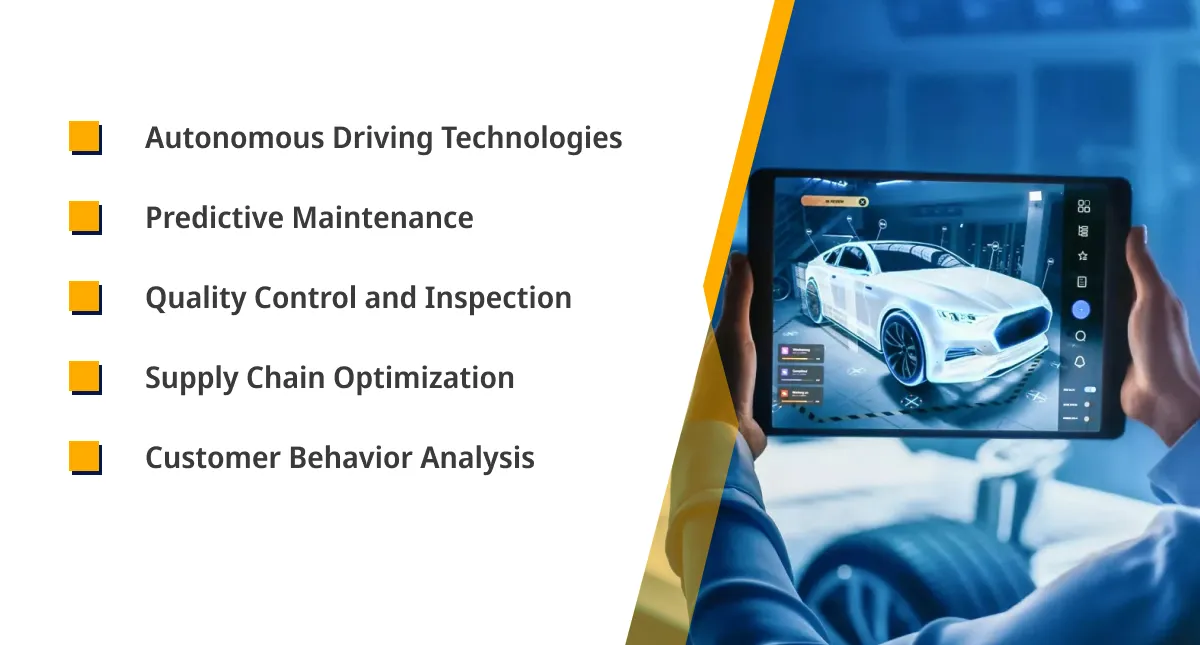
Let’s explore some key applications showcasing the versatility of AI/ML in automotive innovation:
1. Autonomous Driving Technologies: AI for autonomous vehicles goes beyond automation, acting as the brain that enables vehicles to navigate without human intervention. It involves advanced algorithms for interpreting sensor inputs, making split-second decisions, and planning optimal routes.
2. Predictive Maintenance: AI’s predictive maintenance capabilities revolutionize vehicle upkeep. By analyzing data, AI models forecast when components need attention, minimizing downtime and proactively preventing breakdowns, ensuring a smoother and more reliable operation.
3. Quality Control and Inspection: AI systems transform manufacturing by automating quality control. These systems employ intricate algorithms to meticulously inspect products, ensuring adherence to high-quality standards through defect detection and analysis.
4. Supply Chain Optimization: The integration of AI optimizes automotive supply chains by enhancing logistics, inventory management, and demand forecasting. This streamlines operations and contributes to waste reduction and overall supply chain efficiency.
5. Customer Behavior Analysis: AI analyzes vast customer data to uncover insights into buying patterns, preferences, and market trends. This analysis aids in crafting targeted marketing strategies and product development aligned with customer needs.
6. Safety Features Enhancement: AI’s role in advanced driver-assistance systems (ADAS) elevates road safety. Features like collision avoidance, lane detection, and adaptive cruise control utilize AI algorithms to enhance driver safety and prevent accidents.
7. In-Vehicle Personalization and Infotainment: AI-driven experiences within vehicles offer a personalized touch. Climate control, entertainment systems, and driver-assist features are tailored based on individual preferences, creating a more enjoyable driving experience.
8. Traffic Management and Analysis: AI’s analysis of traffic patterns provides real-time information crucial for effective route planning and congestion management. This enhances individual driving experiences and contributes to overall traffic efficiency.
9. Vehicle Telematics and Fleet Management: AI-driven telematics solutions offer real-time insights into vehicle tracking and diagnostics. Fleet management benefits from efficient tracking and maintenance scheduling, ensuring optimal performance and longevity.
10. Energy Efficiency Optimization: AI optimizes battery usage and estimates range in electric vehicles. This contributes to energy-efficient and sustainable automotive solutions, aligning with the industry’s pursuit of environmentally conscious practices.
These applications collectively showcase the transformative power of AI/ML in reshaping the automotive industry, fostering innovation, efficiency, and a more connected driving experience.

Going on the journey of autonomous driving, Automotive Artificial Intelligence (AI) takes the wheel, revolutionizing the landscape with its transformative capabilities. When it comes to AI for autonomous vehicles, several key elements reshape the way we envision and experience driving.
As we navigate the era of autonomous driving with AI as our guide, it’s not merely about reaching a destination; it’s about embracing a future where intelligence, safety, and efficiency converge on the open road. The automotive industry is not just adopting AI; it’s embracing a transformative force that propels us toward an era of autonomous mobility.
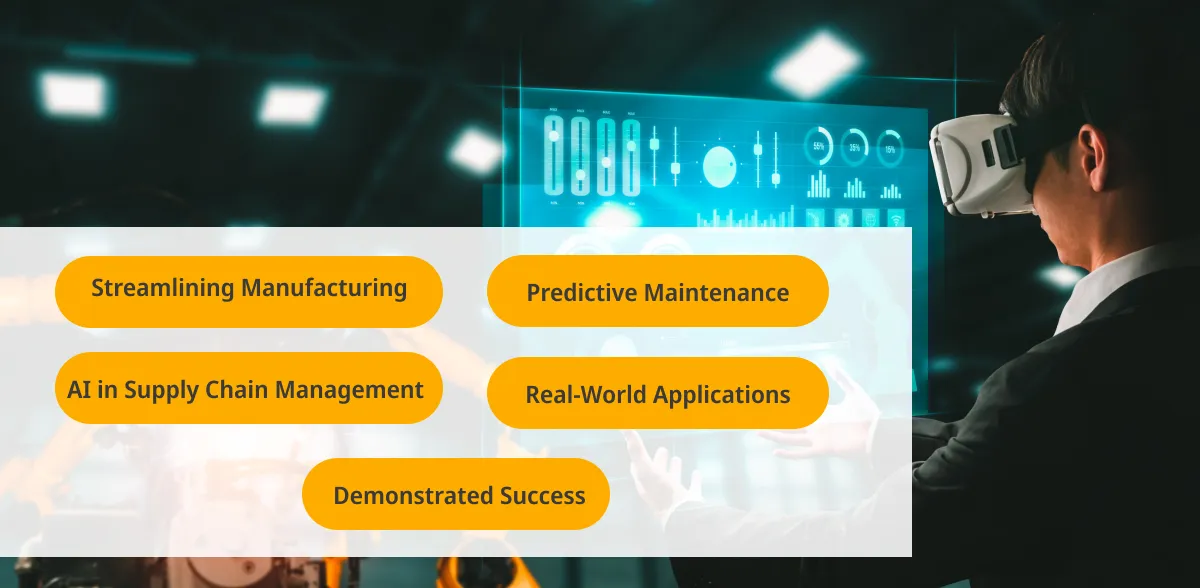
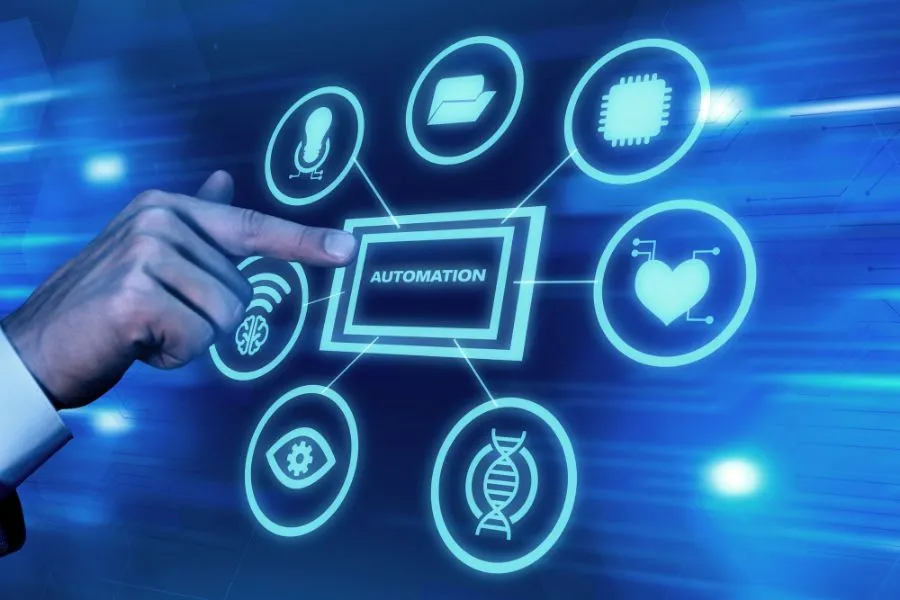
1. Introduction to Predictive Maintenance with AI
2. Minimizing Downtime through AI Predictions
3. Extending Lifespan with AI-Enhanced Reliability

The Role of AI in Customer-Centric Engagement
Utilizing AI for Customer Relationship Management (CRM)

In navigating the expansive landscape of AI in the automotive industry, it’s crucial to acknowledge the challenges and considerations accompanying this technological revolution. While the benefits are substantial, the road to seamless integration is not without its hurdles.
As the automotive industry embraces AI, these challenges necessitate thoughtful solutions to foster a harmonious coexistence of technology and ethical, regulatory, and privacy considerations.
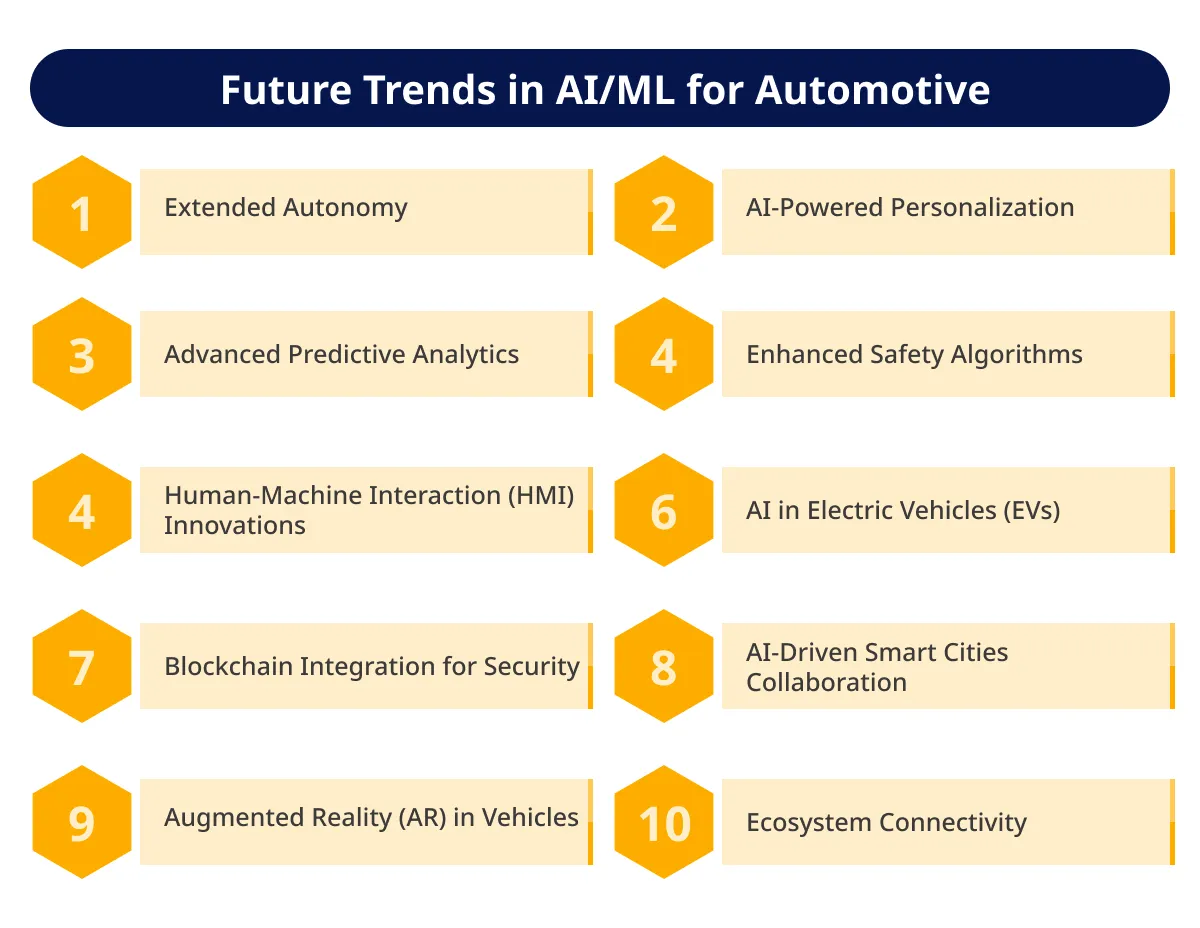
As the automotive industry continues to evolve, the integration of Artificial Intelligence (AI) and Machine Learning (ML) propels it towards a future marked by groundbreaking advancements and enhanced capabilities. Here are key trends shaping the trajectory of AI/ML in the automotive sector:
Collectively, these trends underscore the transformative journey of AI/ML in the automotive industry, promising not only enhanced efficiencies and safety but also a redefined and more interactive driving experience for users. The future holds exciting possibilities as AI continues to shape the automotive landscape.
Ans. ValueCoders brings extensive experience and a track record of successful AI/ML projects in the automotive sector. Industry. Our portfolio showcases leadership in delivering effective AI/ML solutions for the automotive industry.
Ans. ValueCoders ensures a measurable return on investment by aligning AI/ML strategies with business goals. We achieve this by focusing on optimizing critical processes, such as production efficiency, predictive maintenance, and customer experience.
Ans. We implement robust security measures to safeguard sensitive automotive data throughout the AI/ML lifecycle. ValueCoders adheres to industry regulations, ensuring AI/ML solutions meet.
Ans.ValueCoders customizes AI/ML solutions to meet specific business needs, ensuring alignment with automotive industry requirements. Our solutions are designed for scalability, accommodating the growth and evolving needs of automotive businesses.
Ans. ValueCoders offers comprehensive support after AI/ML solution implementation, ensuring a smooth transition and optimal performance. We prioritize ongoing optimization and maintenance, adapting AI/ML systems to stay current and deliver sustained value.
We are grateful for our clients’ trust in us, and we take great pride in delivering quality solutions that exceed their expectations. Here is what some of them have to say about us:
Trusted by Startups and Fortune 500 companies
We can handle projects of all complexities.
Startups to Fortune 500, we have worked with all.
Top 1% industry talent to ensure your digital success.



Let's discuss how we can bring your vision to life.